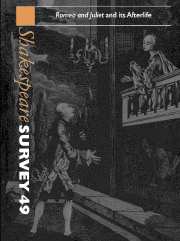Book contents
- Frontmatter
- The Challenges of Romeo and Juliet
- The Date and the Expected Venue of Romeo and Juliet
- The ‘Bad’ Quarto of Romeo and Juliet
- Shakespeare’s Romeo and Juliet: The Places of Invention
- ‘Death-marked love’: Desire and Presence in Romeo and Juliet
- Carnival and Death in Romeo and Juliet: A Bakhtinian Reading
- Ideology and the Feud in Romeo and Juliet
- Bawdy Puns and Lustful Virgins: The Legacy of Juliet’s Desire in Comedies of the Early 1600s
- Picturing Romeo and Juliet
- Nineteenth-Century Juliet
- ‘O, what learning is!’ Pedagogy and the Afterlife of Romeo and Juliet
- The Film Versions of Romeo and Juliet
- The Poetics of Paradox: Shakespeare’s Versus Zeffirelli’s Cultures of Violence
- ‘Lawful deed’: Consummation, Custom, and Law in All’s Well That Ends Well
- ‘Have you not read of some such thing?’ Sex and Sexual Stories in Othello
- French Leave, or Lear and the King of France
- The Actor as Artist: Harold Hobson’s Shakespearian Theatre Criticism
- Shakespeare Performances in England, 1994–1995
- Professional Shakespeare Productions in the British Isles, January-December 1994
- Critical Studies
- Shakespeare’s Life, Times, and Stage
- Editions and Textual Studies
- Books Received
- Index
‘Lawful deed’: Consummation, Custom, and Law in All’s Well That Ends Well
Published online by Cambridge University Press: 28 March 2007
- Frontmatter
- The Challenges of Romeo and Juliet
- The Date and the Expected Venue of Romeo and Juliet
- The ‘Bad’ Quarto of Romeo and Juliet
- Shakespeare’s Romeo and Juliet: The Places of Invention
- ‘Death-marked love’: Desire and Presence in Romeo and Juliet
- Carnival and Death in Romeo and Juliet: A Bakhtinian Reading
- Ideology and the Feud in Romeo and Juliet
- Bawdy Puns and Lustful Virgins: The Legacy of Juliet’s Desire in Comedies of the Early 1600s
- Picturing Romeo and Juliet
- Nineteenth-Century Juliet
- ‘O, what learning is!’ Pedagogy and the Afterlife of Romeo and Juliet
- The Film Versions of Romeo and Juliet
- The Poetics of Paradox: Shakespeare’s Versus Zeffirelli’s Cultures of Violence
- ‘Lawful deed’: Consummation, Custom, and Law in All’s Well That Ends Well
- ‘Have you not read of some such thing?’ Sex and Sexual Stories in Othello
- French Leave, or Lear and the King of France
- The Actor as Artist: Harold Hobson’s Shakespearian Theatre Criticism
- Shakespeare Performances in England, 1994–1995
- Professional Shakespeare Productions in the British Isles, January-December 1994
- Critical Studies
- Shakespeare’s Life, Times, and Stage
- Editions and Textual Studies
- Books Received
- Index
Summary
Having wed Helena at the king of Rossillion's behest, Bertram, the king's ward, refuses to bed her and flies to Italy with her dower, leaving a conditional letter for her: 'When thou canst get the ring upon my finger, which never shall come off, and show me a child begotten of thy body that I am father to, then call me husband; but in such a “then” I write a “never”' (All's Well That Ends Well, 3.2.57-60)
Bertram's marriage, overseen by king and priest, counts as a solemnized de praesenti union for all practical purposes. And as Henry Swinburne confirms in his Treatise of Spousals, 'Spousals de praesenti, though not consummate, be in truth and substance very Matrimony, and therefore perpetually indissoluble.' This treatise, written around 1600 but published in 1686, is the only systematic exposition of marriage laws and the first handbook of canon law to be written in England. According to Swinburne, the use of long absence as a legal means for escape applied only to de futuro spousals.
What, then, is Bertram resisting by refusing to sleep with Helena? What is the status of his apparently impossible condition? This moment in the action has been interpreted by critics as the transformation of a legal possibility into a 'fairy-tale' one, Bertram's stipulation being read as a purely fantastic setting of tasks in the romance mode. But such readings fail to account for Helena's meeting of his terms as though they were an actual legal impediment, and her final securing of him in what is, effectively, a court of law.
- Type
- Chapter
- Information
- Shakespeare Survey , pp. 181 - 200Publisher: Cambridge University PressPrint publication year: 1996
- 1
- Cited by

